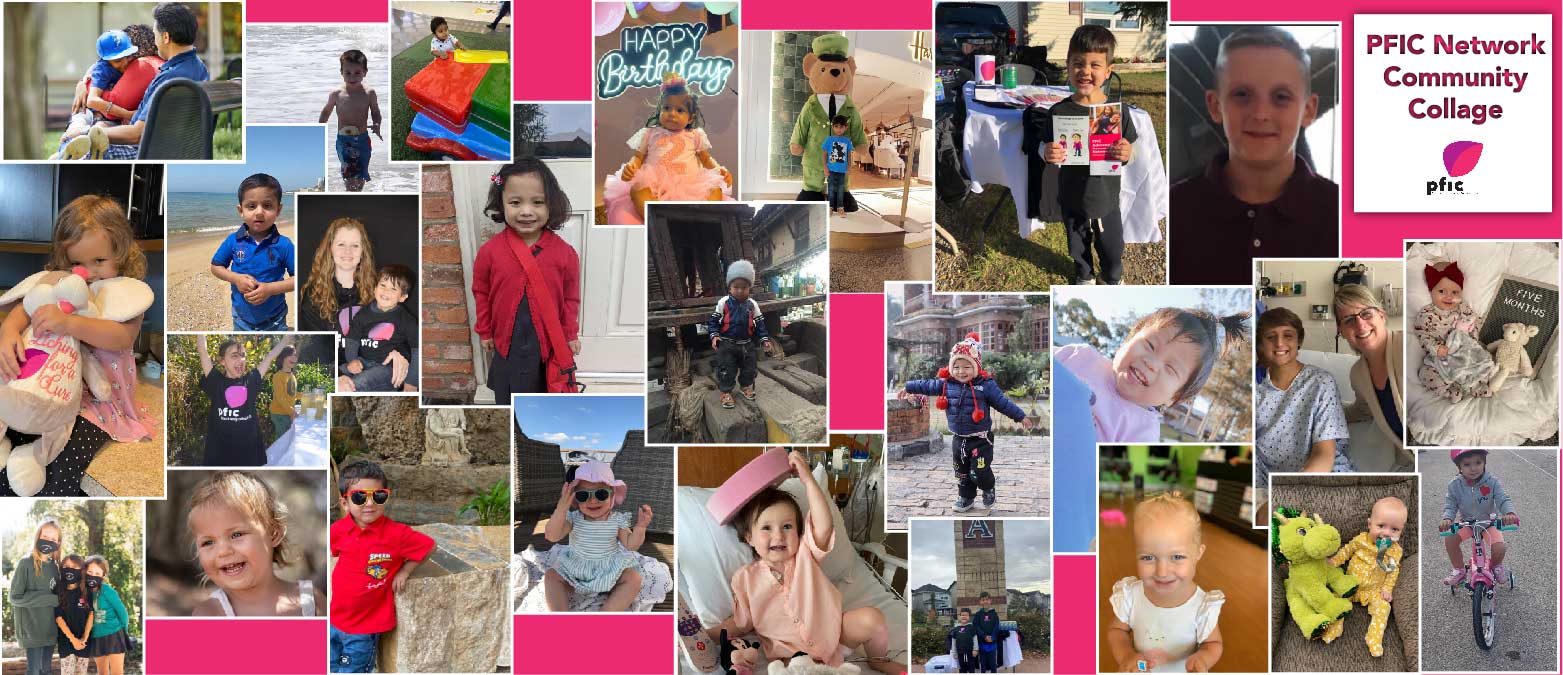Welcome to the Resources for PFIC Families page.
This page was developed BY patients and families, FOR patients and families.
PFIC is a very rare disease, and because of that there are a lot of questions but not a whole lot of answers. Though we are working hard to find solutions, uncertainty is a harsh reality for patients and families with PFIC. We have pooled together our resources including countless years of trial and error, internet research, hospital-provided resources and parent-provided resources. Though we may not be able to answer everything, we sure have tried over the years.
We want this list to grow. If you have a question, answer, or resource that you would like to share on this list of resources, please contact us and we will be happy to make any additions.
#RareButMighty #ItchingForACure. We are all in this together.
Frequently Asked Questions
Are there any support groups that I can connect with as a patient or family member of PFIC?
- Facebook “BRIC, PFIC and other Rare Diseases”
- A private group for patients, friends and families only (Healthcare and industry professionals are not permitted into the closed Facebook group)
- This is the main PFIC support group
- PFIC, BRIC Australia and New Zealand
- Teens and Young Adults Living with PFIC, BRIC and other Rare Diseases
- Liver Families-UK
- PFIC Network Support Group
- Monthly sessions hosted on Zoom
- Group and individual sessions available
- Open to patients, caregivers and family members
Are there any ways that I can provide support to families in need?
- Send a free care package to a friend in the hospital.
- Become a mentor for a new patient or a patient in need, or find a friend for you or your child who can directly relate to the challenges you are facing.
Are there any financial resources available for PFIC patients?
- PFIC Network Financial Assistance Program
- Some local rare disease organizations have financial assistance funds or respite funds.
- Doctors can write prior authorizations if they are not in network providers with your insurance companies. Ask your specialist’s team about this if you are having trouble getting medical bills covered by insurance.
- Crowdfunding (ways to setup personal fundraising pages for medical related costs)
- Go Fund Me
- Give Send Go (no admin fee)
- Ronald McDonald House
- COTA.org
- US resource for fundraising assistance for transplant related costs
- Patient Advocate Foundation
- Free case management services
- Assistance applying for insurance and government aid programs
- Assistance applying for discounts and setting up payment plans
- US Residents
- Angel Flight NE
- Free air transportation to medical appointments
- Primarily US based, but able to support certain international flights as well
- PALS SkyHope
- Free air transportation to medical appointments
- Based on financial need
- NORD Caregiver Respite Program
- Grants to cover the cost of childcare or skilled nursing care to provide relief to caregivers of rare disease patients
- US Residents
- Based on financial need
- United Healthcare Children’s Foundation Grants
- Grants to cover medical expenses for US citizens under age 16
- Based on financial need
- Modest Needs
- Small grants for temporary financial assistance
- Residents of US and Canada
- Based on financial need
- The Ray Tye Medical Aid Foundation
- Funding in-hospital life saving medical treatment and surgeries
- For uninsured patients
- Based on financial need
- Building Blocks for Kids
- Scholarships to families who have children with physical, emotional, and/or developmental challenges
- Must live in the Greater Cincinnati, OH area (120 mile radius)
- Make A Wish Foundation
- Patients with a diagnosis of PFIC can be candidates to receives wishes through the Make a Wish Foundation
-
Canada Specific Financial Resources
- David Foster Foundation – Canadian transplant specific funding. They will fund things such as hotels/apartments, parking, mortgage payments and travel expenses etc.
- At Home Program – Available in the province of BC – They provide financial help for travel, accommodations and tube feeding supplies (vitamins, syringes, physio etc.)
-
India Specific Financial Resources
- Indousrare Indo Us Organization for Rare Diseases
Are there any Scholarships Available for patients or families with PFIC?
- PFIC Network Financial Assistance Program
- Financial Assistance Program Application
- Listed twice on purpose, please use it! Every little bit helps.
Other than medication or surgeries, what kinds of things helped you or your child with the itch?
- Cooling lotions
- Back Scratcher
- Brush for scratching
- Trying to distract your child with play
- See a star, stop the itch (thought stopping)
- Ice packs, cold wet rags
- Cool bath
- Ice pack in diaper bag on the go
Be sure to check out our Rare and Resilient Resources Webinar series. This 5-part webinar series approaches pruritus from a mental health perspective and offers coping skills for managing itch.
How do you help your infant/baby to stop scratching themselves and breaking the skin?
- Full footed pajamas (bamboo material when it’s hot and they still need to be fully covered)
- Scratch mittens
- Sleep sack (if they figure out how to take it off you can put it in backwards to make it more difficult to get to the zipper)
- Scratch-Me-Nots (scratch mittens that are full sleeves for if your baby figures out how to take off regular mittens)
- Older child: fake (acrylic nails)
- Sit outside and look at the stars!
What is an ostomy?
- In patients with PFIC, a surgery called Partial External Biliary Diversion can be performed
- PEBD involves sewing a small piece of intestine between the gallbladder and a hole in the abdominal wall, called an ostomy. This ostomy allows contents within the segment of intestine to drain externally, typically into a small bag that is secured on the outside of belly. Approximately 30-50% of the bile drains out the ostomy
Are there any resources available for ostomy patients?
- United Ostomy Associations of America (UOAA)
- This resource is for ostomies in general. Typical ostomies are created to drain urine or stool. Though the type of ostomy for a patient with PFIC is different, the physical appearance, supplies, and management are the same.
- A family story of Cade, a PFIC boy with an ostomy. A message from Cade’s mother
Are there any other organizations that provide information or resources for PFIC families?
Check out our Global Support Directory for resources and website info.
Boosting Morale During Hospital Stays

- Put in a request for a Care Package from our ambassadors. We can send a gift right to the hospital!
- For children, try to make the room feel like home. Hang pictures, artwork, wear normal clothes if possible. New and special slippers were always a thing for us.
- Check out Brave Gowns for children, great for transplant children who will be in the hospital for a longer period of time!
- Allow your child (or yourself!) to be a part of the decision making process. “Would you like to try your medicine with applesauce or pudding?” can sometimes go a long way for a child who does not want to take meds.
- Take advantage of your hospital’s child life specialist. They are definitely an underused resource.
Preparing For A Longer Hospital Stay
- Bring Crocs or slippers
- Ask about in-hospital laundry facilities for families (bring unscented detergent)
- Bring fave pillow and blanket, stuffed animal
- Bring a bin of activities (books, games, toys) that can be wiped down
- Get involved with child life programming (ask what they can offer)
- Ask about long stay parking rate reductions
- Ask about services for families that the hospital may provide, such as shuttle service or grocery service
Tips For Easier Blood Draws and IVs
- Make sure that the person drawing blood puts the tourniquet OVER a sleeve or clothing (a towel works too). A tourniquet that pinches the skin sometimes hurts worse than the blood draw!
- Numbing
- Ask your nurse if they can use “J-Tip”. Not all hospitals have this available, but if so it is an available resource to numb the area first before sticks. Just a heads up, it’s a loud noise in a slight pressure, so it can also be a bit scary for a little one the first time they use it.
- There are also creams that are sometimes available to numb the area. This requires planning, as the creams usually take 15-30 minutes before they will work
- Some people use ice to numb the area. Just make sure that you are not doing this over small veins, as ice can actually constrict a vein and make it more difficult to give blood.
- Buzzy
- This bee-themed device couples an ice pack with vibration to help reduce pain.
My child does not want to take medications. Any ideas?
- If old enough, you can try transitioning medications to pill form. You can then crush the pills and give with a bit of applesauce or pudding.
- Ask a pharmacist! Pharmacists are a tremendous resource
- Can this medicine be made into liquid and mixed with juice?
- Is there a compound form of this medication?
- Is there a program or coupon to make this medication cheaper?
Are there any ways to make medications more affordable?
- Some medications, particularly compound medications, can be very expensive. Ask your doctor or pharmacist if a medications can be changed to pill form to save money.

